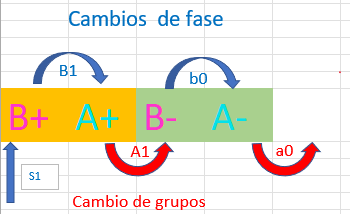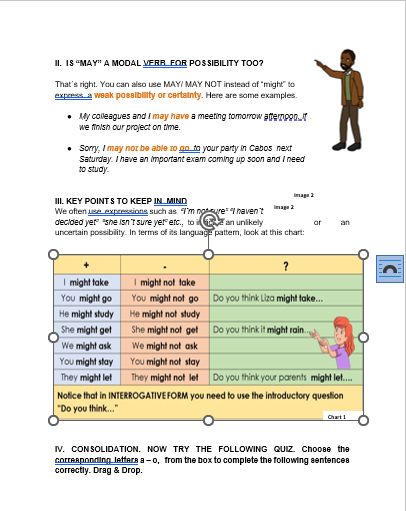
1 MIGHT/MIGHT NOT _ MODAL VERB FOR POSSIBILITY
 Definitely! But what are “modal verbs” exactly? Are they different from “Auxiliary verbs like Do-Does-Did- etcetera”?
Definitely! But what are “modal verbs” exactly? Are they different from “Auxiliary verbs like Do-Does-Did- etcetera”?
Modal verbs are different from auxiliary verbs and from the rest of verbs because they carry a special meaning or intention, added to main verbs. They are very easy to use because they always keep the same format for all subjects (I might, she might, they might); that is, they do not take up a conjugation, and they are always followed by a verb in base form (I might see him, she might go, they might arrive). In general, MIGHT or its negative form MIGHT NOT, (you do not use a contracted form in the negative), is a modal auxiliary that is used to express an unlikely or uncertain possibility .
Here are some examples:
- Melissa might be late for the meeting tomorrow. She hasn´t been feeling well lately and she needs to go to the doctor in the early morning.
- You should take your coat with you, Dad. It looks like it might snow this evening.
- My boss might not go to the Monterrey Conference next week. He isn´t sure yet.
- There might be some pizza left over in the fridge, Mike. I´m not too sure.
- We might visit our grandparents in Acapulco this weekend, but it depends on the weather.
- Jackie might come to her sister´s wedding next month, but she isn´t sure yet. It depends on a loan she wants to get.
- We might go to the Book Fair on Sunday, Monique, if you want to come.
2 IS “MAY” A MODAL VERB FOR POSSIBILITY TOO?
That´s right. You can also use MAY/ MAY NOT instead of “might” to express a wea k possibility or certainty. Here are some examples.
k possibility or certainty. Here are some examples.
- My colleagues and I may have a meeting tomorrow afternoon, if we finish our project on time.
- Sorry, I may not be able to go to your party in Cabos next Saturday. I have an important exam coming up soon and I need to study.
